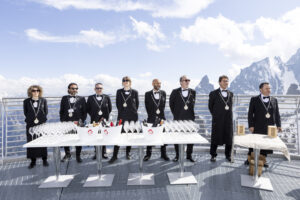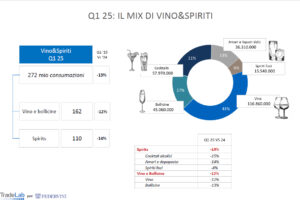The world has had to face many challenges and is trying to get out of the Pandemic, by restarting at full capacity and promoting especially in person events and initiatives. It will be essential for Italian wine to try and recover part of what was lost during these difficult months, consolidate top positions on some markets, and return to growth. The fundamental instrument, as always, will be CMO Wine for promotion in Third Countries, within the framework of the CAP, whose cycle, after the various extensions, will be definitively expired in 2023. In the meantime, in March, the Ministry of Agriculture published the definitive ranking of projects admitted for financing on the National quota (30% of the 100 million euros available each year in Italy, while 70% is allocated to the Regions), confirming the temporary one published in January (which WineNews reported). It will activate projects for a total value of 59 million euros, including private investments, and 29.6 million euros for public co-financing (23.6 million euros budgeted in the 2020/2021 financial year in the form of advance, and 5.9 million in subsequent financial years, as balance payments, ed.). WineNews has learned from the supply chain and the institutions that the discussion, at the Ministry of Agricultural Policies and Regions level, regards maintaining some management flexibility implemented in the last call linked to the challenging operational scenario due to Covid-19, but above all reorganizing timing for the next calls, as well as existing projects. The topic on the table would also include extending the duration of the projects approved in the 2020/2021 call from December 31, 2021 to February 28, 2022, and moving publication of the 2021/2022 call to September 2021, extending the duration of the projects from March 1, 2022 to December 31, 2022, except for further extensions or advances, based on decisions for managing the transition to the new CAP in 2023.
It is a prickly issue, however. On one hand, a shift in the timing of implementing projects already underway, and upcoming calls, would allow us to have a clearer picture of the International scenario during a phase which, hopefully, the Pandemic and its restrictions will have completely or almost completely overcome, as well as helping those who are late in implementing projects. On the other hand, it would reduce timing of implementing projects for the next campaigns to just a few months, and thus diminish the efforts of those, instead, diligently following the schedule. Furthermore, it must be taken into account that, even though there appears to be a remote possibility that wine will lose its specific CMO, the definitive version and all the subsequent measures of the new CAP starting in 2023, has not yet been written. In any case, the resulting picture is one of uncertainty that benefits no one. Indeed, it will not help those who have already put in place projects spread over “official” timelines, nor those working on planning and implementing promotional initiatives, having to deal with the basic problems of managing an instrument that is, however, portentous, like CMO WINE.
“The issue of promotion in third countries and utilizing funds is a topic that should be addressed in the perspective of planning and vision, and instead it has always been dealt with at the last minute, under deadline, therefore, without a real programmed vision at the service of companies”, pointed out Silvana Ballotta, at the helm of Business Strategies, one of the most important firms in the field of consulting and business internationalization, to WineNews. “The best possible compromise solutions have always been found at the time, but they have never been the ideal ones for a Country that needs to promote itself in order to remain strong and restart on the world markets. It is certainly not postponing the deadlines by two months that the issues on the table will be resolved. There are many and important issues. For instance, we are still not certain about lowering the threshold to not risk revoking the loan, which today is 80% of the value of the project. It is important in a context in which it has sometimes not been possible to spend resources not for inefficiency, but because of force majeure. Plus, there is no flexibility on the Third Countries target, and it is not clear why during an already approved project, if there is an opportunity that can be seized, companies are not allowed to do so. Bureaucratic adjustments are gradually being made concerning the constraints within which we must move, but which, in fact, do not support the companies”.
“The uncertainty of regulations in an International framework linked to the Pandemic is improving, but it is still very complicated”, commented, to WineNews, Marina Nedic, at the helm, together with Giancarlo Voglino of IEM - International Exhibition Management, a company that for over 20 years has been working on the markets all over the world organizing events to promote Italian wine, “especially on International travel, which certainly doesn't help. That said, it is clear that CMO funds for promotion were important before, and will be even more so in the future. But, it is essential to be able to use them through programming, to budge expenditures as effectively as possible through both public and private resources, because we are always talking about co-financing. Not knowing whether the current year will end in December 2021 or February 2022, or how long the next programming will last, complicates things even more. This is especially true for events that we and other players organize, which in some cases might also be anticipated or postponed - even though they have their own important cycles - and other initiatives such as those linked, for instance, to monopolies in Countries where they are present, which are scheduled instead from year to year. And, I am not aware that there are such critical issues in managing the CMO tool in Italian wine’s competitor Countries. This is also the reason that some companies, especially the Consortiums, have begun to look more than at the CMO funds, to those managed by CHAFEA (the Executive Agency for Consumers, Health, Agriculture and Food Safety of the European Union, ed.), which are more difficult to obtain, but have three-year cycles and a level of co-financing that reaches 80%, and above all, when obtained, allow for multi-year planning which is extremely important”.
Wine companies are facing a complicated present, like never before. Therefore, we are working on a future in which efficiently managing public and private resources in support of the sector will have to be better than in the past, because the post-Covid-19 scenario will be somewhat different, and much more competitive, even for wine.
Copyright © 2000/2025
Contatti: info@winenews.it
Seguici anche su Twitter: @WineNewsIt
Seguici anche su Facebook: @winenewsit
Questo articolo è tratto dall'archivio di WineNews - Tutti i diritti riservati - Copyright © 2000/2025








































































































































































































